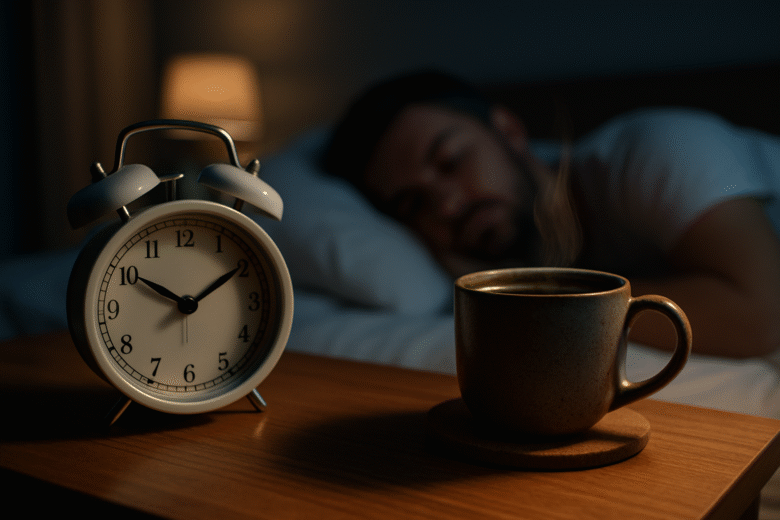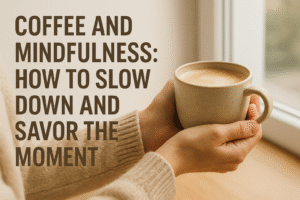Coffee is an essential part of many people’s morning rituals, boosting focus, improving mood, and providing comfort.
But that same cup that energizes your day can also interfere with your night. The relationship between caffeine and sleep is complex, and learning to manage it well is key to both enjoying your coffee and protecting your rest.
In this article, we’ll explore how caffeine affects the sleep cycle, how long it stays in your body, and how to create coffee habits that keep you sharp during the day—without keeping you awake at night.
How Caffeine Affects Your Brain and Sleep
Caffeine works by blocking adenosine receptors in the brain. Adenosine is a natural compound that builds up during the day and signals to your brain that it’s time to rest. By interrupting this signal, caffeine makes you feel more alert and reduces the sensation of sleepiness.
But when caffeine lingers too long in your system, it disrupts the body’s sleep-wake cycle, also known as your circadian rhythm. This can lead to:
- Trouble falling asleep
- Reduced deep sleep stages
- Lighter, more fragmented sleep
- Waking up tired, despite a full night in bed
If you’ve ever tossed and turned after an afternoon espresso, caffeine may be to blame.
How Long Does Caffeine Stay in Your Body?
Caffeine has a half-life of about 5 to 6 hours, which means that if you drink a cup of coffee with 200 mg of caffeine at 2 PM, you’ll still have around 100 mg circulating in your system by 7 or 8 PM.
For some people, especially slow caffeine metabolizers, the effects can last even longer. Genetics, age, liver health, and medication use all influence how your body processes caffeine.
That’s why some people can drink coffee after dinner with no issues, while others are wide awake at midnight from a late-morning cup.
Signs That Coffee Is Affecting Your Sleep
Even if you don’t feel “wired” at bedtime, caffeine may still be silently undermining your sleep quality.
Watch for these signs:
- You wake up tired, despite getting 7–8 hours of sleep
- You fall asleep quickly but wake up frequently
- You experience vivid dreams or restless nights
- You feel anxious or restless in the evening
- You rely on coffee just to feel normal the next day
If these sound familiar, caffeine timing may be disrupting your rest cycle.
When Should You Stop Drinking Coffee?
To minimize the impact of caffeine on sleep, most experts recommend a “caffeine curfew” between 12 PM and 2 PM.
Here’s a general guideline based on sleep time:
- If you go to bed at 10 PM, stop caffeine by 2 PM
- If you sleep at midnight, stop caffeine by 4 PM
- The earlier you cut off caffeine, the better for deep, restorative sleep
Highly sensitive individuals may need to stop by late morning. Listen to your body and experiment to find your personal limit.
Does Decaf Coffee Affect Sleep?
Decaf coffee still contains a small amount of caffeine—usually between 2 and 15 mg per cup, compared to 80–150 mg in regular coffee.
For most people, this amount is unlikely to disrupt sleep, especially if consumed early in the evening. However, if you’re extremely sensitive, even decaf may keep you alert.
If you’re looking for a nighttime ritual without the stimulation, try:
- Herbal teas (chamomile, peppermint, rooibos)
- Warm milk or golden milk
- Chicory coffee or other caffeine-free alternatives
These offer the same comfort and warmth as coffee without the sleep disturbance.
Tips for Coffee Lovers Who Want Better Sleep
Here’s how to enjoy coffee while preserving high-quality sleep:
1. Time it Right
Have your last cup by early afternoon, and save caffeine-free drinks for the rest of the day.
2. Limit Daily Intake
Stick to 2–3 cups per day, or under 400 mg of caffeine total. Some people may need even less.
3. Pair with Food
Avoid drinking coffee on an empty stomach—it can amplify anxiety and interfere with energy balance.
4. Stay Hydrated
Dehydration increases fatigue and reduces sleep quality. Coffee is mildly diuretic, so drink plenty of water throughout the day.
5. Watch for Hidden Caffeine
Energy drinks, sodas, chocolate, and even some pain medications contain caffeine. Keep these in mind when tracking intake.
The Role of Sleep in Caffeine Sensitivity
Ironically, poor sleep increases your dependence on caffeine, which can lead to a feedback loop:
- Poor sleep → more coffee
- More coffee → worse sleep
- Cycle repeats
Breaking this loop requires prioritizing rest and possibly taking a short caffeine reset—2 to 3 days with no or low caffeine to recalibrate your system.
During a reset, you may feel tired at first, but your natural energy rhythms will begin to reemerge—and sleep often improves rapidly.
Better Coffee, Better Sleep: The Balance
To maintain both the benefits of caffeine and the healing power of deep rest, focus on balance.
Coffee is most effective when:
- Used strategically (not constantly)
- Paired with movement and light in the morning
- Avoided during stress-driven consumption
- Part of a wider routine that includes hydration, nutrition, and rest
Sleep is your recovery system. If your coffee habit is harming your sleep, it may be time to shift—not stop, but optimize.
Should You Switch to Tea?
Tea contains caffeine too, but usually in lower amounts:
- Black tea: 40–70 mg
- Green tea: 20–40 mg
- Herbal tea: 0 mg
Switching to tea in the afternoon can ease your caffeine taper, helping you wind down without the crash of cold-turkey quitting.
Green and oolong teas also contain L-theanine, an amino acid that promotes calm focus and can help counter caffeine-induced anxiety.
Conclusion: Sleep and Coffee Can Coexist
You don’t have to give up coffee to sleep well—but you do need to be intentional. Understanding how long caffeine stays in your system and adjusting your habits accordingly will help you enjoy the full benefits of coffee without sabotaging your rest.
Start by observing how you feel after your last cup each day. Make adjustments in timing, portion, or brew style. Your future self—rested, alert, and clear-headed—will thank you.

Marcio Luzardo is a coffee enthusiast and the voice behind Tudo Viraliza. With a passion for turning curiosity into practical knowledge, he shares easy-to-follow tips, guides, and insights to help readers enjoy better coffee every day. When he’s not writing, Marcio is exploring new brewing methods or diving into the rich stories that connect coffee to culture, lifestyle, and wellness.



